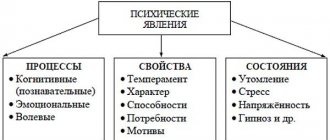In order to understand the meaning of the word “authoritarianism” as accurately as possible, it is easiest to cite a number of synonyms, such as: antidemocratism, totalitarianism, authoritarianism.
Authoritarianism is a style of behavior that is characterized by a strong desire to subordinate, dominate, manage and lead, making absolutely all decisions. An authoritarian person is not inclined to consult, discuss or listen to someone’s opinion; for him there is only his view of reality and his opinion, which he considers the truth.
Authoritarianism as a behavioral style can manifest itself in such areas as leadership, education and communication. However, the characteristics of behavior in all these areas differ little. At work, in the family and in the personal sphere, the authoritarian personality type is manifested in the following factors:
- Increased aggressiveness, rigidity.
- Tendency to coercion, threats, pressure on others (family members or subordinates).
- Strict control, striving for maximum discipline.
- Excessive demands.
- Ignoring the psychological factor, human emotions.
- Focus on results.
- Uncompromising.
This behavior is common, and it has its reasons. The first lies in strict upbringing. A child growing up in a family where authoritarian upbringing reigns is likely to grow into just such a leader. Often an authoritarian leader comes from a person who grew up in a dysfunctional family or was unsuccessful at school, and all his dreams were aimed at achieving success, material well-being, and stability in life.
We recommend: What does agoraphobia mean?
Sometimes an authoritarian leadership style is the result of psychological trauma, loneliness, childhood grievances, or a desire for revenge. Often people choose the authoritarian leadership style consciously, believing that only it leads to real success and achievement of maximum results - in the family, in communication, at work.
Authority and authoritarianism
Many people confuse these concepts. But the difference between them is huge. Authority is a form of influence that a person acquires through his wisdom, ethical behavior, and also by observing public morals and certain social rules.
The difference is obvious. An authoritative person honestly earns respect for himself by building a good, positive reputation. As a result, other people want to be equal to him - he himself does not even need to do anything for this.
But authoritarianism is a completely different definition. A person who is characterized by this quality proclaims his power himself. And he makes others obey him.
Military-bureaucratic regime
A distinctive feature of this type of authoritarian regime is the seizure of power in the country by a group of military officers through a coup. At first, all power is concentrated in the hands of the military, but later representatives of the bureaucracy are increasingly involved in management. In the future, this type of management may gradually take the path of democratization.
The main factors that lead to the establishment of military regimes are dissatisfaction with the existing government and the fear of revolution “from below.” It is the latter factor that subsequently influences the restriction of democratic freedoms and the right to choose. Preventing the intelligentsia, which is opposed to such a regime, from coming to power is his main task.
The most typical representatives of this type of authoritarianism are the regime of Nasser in Egypt, Pinochet in Chile, Peron in Argentina, and the juntas of 1930 and 1969 in Brazil.
Key Features
So, what authoritarianism is is clear. It is easy to discern the presence of this quality in a person’s character. This is indicated by the following manifestations:
- The desire to achieve one's goal at all costs.
- The desire to dominate.
- The desire to take the highest position.
- The habit of manipulating others or a pronounced tendency to do so.
- Masterful use of people to achieve personal goals.
- The habit of putting pressure on others.
Authoritarianism is the quality of an individual owner. Anyone who is characterized by this does not listen to outside opinions, does not take them into account when making any decisions, and also rather rudely suppresses any initiatives coming from outside.
And the reason for this behavior is very fanatical: a person sees in these actions self-will and even some kind of encroachment on his authority.
Absolutist monarchy
This type of authoritarianism is inherent in modern absolute and dualistic monarchies. In such states, power is inherited. The monarch has either absolute powers to govern the country or weakly limited ones.
The main examples of an authoritarian regime of this type are Nepal (until 2007), Ethiopia (until 1974), as well as the modern states of Saudi Arabia, Qatar, UAE, Bahrain, Kuwait, Morocco. Moreover, the latter country is not an absolute monarchy, but a typical constitutional (dualistic) one. But, despite this, the power of the Sultan in Morocco is so strong that this country can be classified as an authoritarian state.
Relationships with other people
In the social sphere, authoritarianism always manifests itself. A person who has this quality can be seen from afar: he has a confident gait, a serious look and no hint in his behavior that he can be addressed otherwise than as “you.” When such a person enters a room, others almost immediately get the feeling that it belongs to him.
Such a person recognizes only his own kind. He will only make contact with someone who has inner strength, but it should not be more developed than he himself. He respects “his own people.” He despises all other people who do not meet the “standards”.
And in communication, such a person adheres to only one rule: “I speak - you listen. And then you perform.” This works, of course, only with weak people. Such a person enters into confrontation with those who object.
Character traits
To make it easier to identify such a person among your friends, you should understand who he is, an authoritarian person. What character traits does the person have, what are her preferences and value system:
- Conservatism. A person does not like something new, and will make his small revolutions based on long-proven methods. Innovation scares people because new technologies seem unreliable and untested. Confidence in technology and methods of action are very important for such a person.
- Servility. Another feature of authoritarianism is the leader’s desire to enslave the consciousness of his subordinates. For his “subjects,” an authoritarian person wants to be almost a god, well, at least an idol.
- Cult of power. A person believes that everything in the world can be achieved through coercion. But this does not mean that he will use his fists to achieve his goals. A person will stop at nothing to make his desires come true.
- Cynicism. A person who is an authoritarian person will treat everyone around him with contempt. And since contempt on the face is not the best mask, the person will mask his true emotions under cynicism and sarcasm.
Two sides of the same coin
Even based on the above, one might think that authoritarianism is a purely negative quality. Many people believe that people who have it have low moral values, always push other people around, and act through violence. In general, tyrants and despots.
It may be so. But in such situations we need to talk about immense, fanatical authoritarianism. This is important to consider. Because there are people who also have this quality, but they achieve their goals by skillfully creating a positive atmosphere around themselves, building respect for themselves.
A competent, spiritually developed authoritarian person selects the appropriate environment and environment, setting a high bar for other people. He is disciplined himself and expects the same from others.
And there are other people. They are disorganized, irresponsible, weak in spirit, but they demand impeccable behavior, efficiency, etc. from others. By the way, we are talking about both the work and personal spheres.
Test
Are you into socionics? You will like this personality type test. By answering the questions, you can understand how your worldview is similar or divergent from authoritarian people. You need to answer yes or no. Below are some questions from the F-scale test:
- Should children be taught respect and obedience before anything else?
- Can a person without good manners exist normally in polite society?
- Will a person achieve success only when he works hard?
- Are industrialists, managers and salespeople more important than artists and writers?
- Our universe is unknowable, and man will never be able to comprehend all its secrets.
- Is man a toy in the hands of supernatural power?
- Will a liberal person become a conservative with age?
- Are laws not as important to the state as a smart leader who will show people the path to happiness?
Do you believe in socionics? The personality type test should show you how much authoritarianism is developed in your soul. If you answered yes to most of the questions, then this means that at heart you are a born dictator.
Stupidity and inflated self-esteem
These are the two main reasons for the unreasonable authoritarianism of an individual. Many people, being nothing of themselves, make excessive demands on others. At the same time, they always consider themselves to be right in everything and the smartest. And they live by the principle: “There are only two opinions - mine and the wrong one.”
Of course, such people do not have much success in their work, but this does not bother them. By the way, they can justify this fact by bad luck, bias of their superiors, etc. Such people skillfully seek excuses; everyone around them may be to blame.
But in their personal lives, nothing prevents them from showing authoritarianism. The synonym “despotism” is ideal in this case. If they have loved ones or relatives, then these people will take it out on them in full, acting as a kind of energy vampires. How exactly?
Why does a person become authoritarian?
Authoritarianism develops for many reasons. As mentioned above, the creator of the authoritarian personality theory agrees with Sigmund Freud that such problems begin in childhood. It's all due to wrong upbringing.
Imagine a situation where a mother surrounds her child with excessive care. In her opinion, she can protect her son or daughter from bad things. But in fact, it instills anxiety in the baby. The child is afraid to do anything without mother's permission. As an adult, he will unconsciously be afraid of everything in the world. And in an attempt to get rid of this fear, he will always strive to control everything.
Another consequence of overprotection is lack of independence. If in childhood parents protect the child from work and make decisions for him, he will grow up unsure of himself. But at the same time, such traits as arrogance and self-satisfaction will develop in him. Such a person disguises his inability to take decisive action as self-confidence. At the same time, he manipulates those around him, shifting responsibility onto them, forcing them to act in his own interests.
Manifestations of authoritarianism bordering on tyranny
They can be identified in the following list:
- Groundless and frequent criticism, concerning literally everything: from appearance to the way you move. At first it may be unobtrusive, but then it becomes so obvious that the victim may develop a feeling of inferiority.
- An attempt to limit external contacts. Such authoritarianism is common in families where the husband is a tyrant. He simply takes control of the victim’s social circle, independently deciding with whom she can communicate and spend time and with whom she cannot. Authoritarian wives, parents, boyfriends and girlfriends can do the same. The purpose of this behavior is to subjugate the victim, to make him dependent.
- Eternal dissatisfaction and the habit of not asking, but demanding. A complete lack of gratitude.
If a person with whom such an “authority” comes into contact tries to express his complaints and indignation regarding such behavior, then he will immediately become guilty and ungrateful.
Family
An authoritarian person is a person who received the wrong upbringing. The parents neglected to look after the child and therefore he began to develop various phobias and strange preferences that contradict normal social principles. Which families contribute to the development of an authoritarian personality? A family with one parent, a family in which the father drinks and a family that is overprotective of the child. It is the extremes that create an unhealthy child. A person should grow up in an atmosphere of love and tenderness from childhood. If he doesn't receive enough attention from his parents, he will grow up embittered and hate everyone. If the mother fussed too much over the child, she will be able to raise a selfish creature who will manipulate others without a twinge of conscience. Therefore, it is the parents who are entrusted with the task of properly developing their child. There is no need to blame your mistakes on bad teachers or the bad influence of the street. A good family will never raise an antisocial type.
Features of thinking
Their consideration is also worth paying attention to, since we are talking about what authoritarianism is. The peculiarity of the thinking of people who are characterized by this quality is the following: they attach great, even decisive importance to the opinions of famous, powerful people.
They specify and then strengthen the propositions put forward by finding and combining a variety of quotes and sayings, the authors of which are certain authorities. For such people, these individuals are idols. They believe that by following world authorities and copying their behavior, they are guaranteed to achieve success. At the same time, they are not at all embarrassed by the fact that to this or that leader is like walking from the Earth to the Moon.
Thus, authoritarianism in psychology is a specific characteristic that manifests itself in inflated self-esteem, aggressiveness, the habit of observing stereotypes, as well as weak reflection.
Post-totalitarian regimes
This is a special type of authoritarian regimes that is formed in societies moving along the path from totalitarianism to democracy. At the same time, the phase of authoritarianism is not at all necessary on this road, but it is inevitable in those former totalitarian countries where it was not quickly possible to build a full-fledged democratic society.
Post-totalitarian regimes are characterized by the concentration of significant economic assets in the hands of representatives of the former party nomenklatura and people close to them, as well as the military elite. Thus, they turn into an oligarchy.
Typical representatives of post-totalitarian authoritarian regimes are the countries of the former USSR, except for the Baltic states.
Are there any advantages?
No matter how strange it may sound after everything previously mentioned, authoritarianism has positive sides. But only if it is correctly integrated into your behavior.
It can greatly help people in leadership positions. Having instilled a certain authoritarianism in yourself, it will be easier to cope with large amounts of information, obligations and subordinates.
The person himself will notice that he has become more independent and confident. How to do it? We need to cultivate inner strength within ourselves.
The best technique is training in front of a mirror, which involves pronouncing various mottos, calls and motivating exclamations. It is imperative to take confident poses, form a fixed gaze, and monitor facial expressions and gestures.
You can turn to yourself, exclaiming: “You can do it! You are a confident, strong, authoritative person! You are respected and listened to!” In general, practice self-hypnosis.
Democratic style, or “Let's think together”
Alexey K., a young manager, left Gennady Pavlovich’s company and founded his own business. He decided to learn from the mistakes of others and realized that he would not allow such a dictatorship as reigned at his previous place of work. Alexey recruited young employees who were more like-minded than his subordinates. From the first days, he began to adhere to a democratic leadership style: he discussed the company’s development strategy with employees, listened to their ideas and opinions, and trusted them to work on projects independently. For the workers, he was not a strict boss, but his friend Lekha. One day this almost ruined the company: the employees relaxed and stopped taking Alexey seriously. Some people began to be late, miss the deadlines for completing tasks, and to the bewilderment of the boss they said: “Whatever, I’ll do it, don’t worry!” When deals with profitable clients began to fall through and the company lost profits, the young businessman realized that it was time to change something.
Democratic management style is a deceptive thing. To the young and modern, it seems to be the only acceptable one and in keeping with the spirit of the times (well, don’t work the old fashioned way!), but if you loosen the reins a little, it will turn out like in the example above. To prevent democracy from turning into anarchy and permissiveness, the leader must have management experience.
In general, the democratic style is truly a priority in young modern companies. The manager does not make decisions alone - he consults with the team, organizes brainstorming sessions, and tries to ensure that each employee reveals his or her potential. He himself works as an equal or assigns himself the role of a consultant or mentor. If a democratic boss makes a mistake, he does not blame the staff for everything, but draws conclusions. At the same time, he remains the leader - he does not remove himself from the main role, does not emphasize that “we are all equal here, guys.” That is, a team is a team, but the hierarchy must be clearly built.
Disadvantages of the democratic style
- The possibility of anarchy, belittling the role of the leader, and the emergence of opposition in the team. In general, everything that was described using the example of Alexey K.
- Decisions can take a long time to make. The more people involved in the discussion, the longer the process may take. Time management and clear deadlines for setting tasks will save the day. For example, 3 days are given for discussion and introduction of improvement proposals - and not a second longer. This disciplines employees and speeds up business processes.
Pros of a democratic style
If mistakes are avoided, a democratic style can become the basis for creating a cohesive team.
- Strengthens team spirit, makes employees true like-minded people, united by one goal. It’s good if the company has a well-developed corporate culture - mission and values, main tasks for the coming years, a common Big Idea.
- Reduces the number of errors in work. The more people involved in solving a problem, the greater the chance that the optimal option will be found. Just remember that the discussion should not drag on.
- Minimal staff turnover. Why leave the team if you share its values and objectives, and feel involved in one common goal? That's right, there's no need. Employees rarely leave companies with a democratic management style (if, of course, they join the team and share common values).
Manifestations at work
If a manager considers it necessary to become authoritarian in the eyes of his subordinates, then he can resort to some effective methods. Let's say we introduce penalties. This is a guarantee of unquestioning obedience. Although doubtful.
Because of sanctions, subordinates will develop a fear of punishment. And people don't like being made to be afraid. They, of course, will stop being late and will meet deadlines, but they will still call the boss behind his back not the best words.
Therefore, it is better to motivate them to obey and be responsible in a different way. For example, put a monthly bank in the amount of 30,000 rubles (for example), and say that it will go to the one who makes the most sales. The investment in the bonus will pay off - the offer will interest everyone, and everyone without exception will begin to work more actively. Sales will increase significantly, and the bank will go to one.
The same method will also increase respect for the leader - people like it when their importance is proven financially. Such methods work much better than command intonations and commanding tone.
Corporate authoritarianism
The corporate form of authoritarianism is considered its most typical type. It arises in societies with relatively developed economies, in which various oligarchic groups (corporations) come to power. In such a state system, there is practically no ideology, and the economic and other interests of the group that has come to power play a decisive role. As a rule, in states with corporate authoritarianism there is a multi-party system, but these parties cannot play a significant role in political life due to the apathy of society towards them.
This type of political regime became most widespread in Latin American countries, in particular in Guatemala, Nicaragua (until 1979), and Cuba during the reign of Batista. There were also examples of corporate authoritarianism in Europe. This regime manifested itself most clearly in Portugal during the reign of Salazar and in Spain during the dictatorship of Franco.
Parenting
This topic also deserves a little attention. Parental authoritarianism is a negative phenomenon, which is the subject of many books and scientific works. In such a family, the father and mother treat the child as if they were a subordinate. Here are just a few signs of parental authoritarianism:
- They do not consider it necessary to praise the child for successes and achievements.
- They don’t ask him for anything - they just give orders, orders.
- The child is required to unquestioningly follow any instructions. No attention is paid to his desires and needs.
- Compromises are categorically denied.
- Obedience, respect and adherence to traditions always come first.
- The child is limited in his independence and freedom, often without justifying his decisions.
Authoritarianism makes parents real tyrants. Many fathers and mothers are not just strict - they are cruel, often crossing the line. In most families, this leads to cruel treatment and beating of children.
And parents may argue that this is for the benefit of the child. But in reality, this educational approach is focused only on their needs.
general characteristics
As you can see, an authoritarian regime is a rather ambiguous form of government with no clear boundaries for definition. Its place on the political map lies between the democratic and totalitarian systems. The general characteristics of an authoritarian regime can be described as a compromise between these two regimes.
Under an authoritarian regime, some freedoms are allowed in relation to members of society, but as long as they do not threaten the ruling elite. As soon as a threat begins to emanate from a particular force, political repression is applied against it. But, unlike a totalitarian society, these repressions are not massive in nature, but are applied selectively and narrowly.
However, many political scientists believe that authoritarianism for post-totalitarian societies and for countries with poorly developed economies and a low level of development of socio-political relations is the best form of government.
Consequences
Continuing to discuss what authoritarianism means, it is necessary to make a reservation that the above-mentioned educational approach almost always affects the child’s psyche.
During adolescence, conflicts, misunderstandings arise, and hostility develops. Some older children may even run away from home to free themselves from parental rules, prohibitions and reproaches.
But this is the act of a strong, active teenager. In such families, children rarely grow up like this. As a rule, they, on the contrary, become downtrodden, pliable and insecure. It is difficult for them to even imagine that they can act differently - not as their parents told them.
When it comes to parenting, authoritarianism is a huge problem. This approach leaves a tangible imprint on the formation of personality. Children in such families grow up to be absolutely stress-resistant, indecisive, unbalanced and with weak self-esteem.
It is also difficult for them to adapt to society, to start any relationships in the future, and to realize self-realization. In addition, they have no idea what spiritual intimacy, love and affection are.
Education
The authoritarian type of person protests against some rules and standards. He is not against learning, but he is only interested in knowledge and skills that can be useful in the future. Most often, such individuals choose technical rather than humanitarian professions. An authoritarian person tries to improve his vision of the world, but he is limited by the ability to see from only one point of view. He cannot put himself in the position of other people. Therefore, exact sciences are better for people. Such a person receives knowledge with pleasure and never refuses to take any courses. A person continues his studies even after graduating from an educational institution. After all, to be a good and competent specialist in any field, you need to constantly improve yourself.
Resistance to authoritarianism
There is practically none. Because humility has long become a stable archetype of the collective unconscious in our society.
In society, the vast majority of people are accustomed to completely obeying their superiors, and have been for a long time. This is manifested in a variety of sayings and proverbs, including: “Obedience is more important than prayer and fasting,” “I will obey and fall at my feet,” “Whoever has the whip, our hearts and backs belong to him,” etc.
That’s why authoritarian attitudes are still alive. For the same reason, many parents, bosses and teachers consider the approaches described above as the most effective and efficient. Some consider this the only possible way to achieve their goals and fulfill their mission.
"Masks of Authoritarianism"
This is the name of the literary work created by the authors Joel Kramer and Diana Olstead. Every person interested in the topic discussed in the article should read it.
The book describes authoritarian ideologies, mechanisms of control and submission in a variety of areas of life, the techniques used, and much more. The topic of religion is also touched upon. The book also helps to understand people’s behavior, to understand why certain people, who seem reasonable, accept any ideology.
The overall message of the book is very valuable. People who read it are ready to parse every page into quotes. Therefore, if you want food for thought, you should pay attention to “Masks of Authoritarianism.”
How does it arise
Its history began in ancient Sparta and the despotisms of the Ancient East, and continued in European feudal absolute monarchies and dictatorships of the 1930s, Latin American military regimes, and “people's democracies” of the socialist camp. The concept was first formalized at the beginning of the 19th century by the French philosophers J. de Maistre and L. de Bonald. It was developed in the works of H. D. Cortes, O. Spengler, I. Ilyin, C. Maurras, and other thinkers.
On a note. According to gtmarket.ru, in the ranking of countries in the world by level of democracy as of November 2021, Russia was in 144th place with an index of 2.94. Countries with a score below 4 are classified as autocracies.
The authoritarian form of government is considered a compromise between totalitarianism and democracy, a kind of crossroads. As history shows, a democratic outcome is not at all necessary. The tougher the autocracy, the greater the likelihood of a transition to totalitarianism and despotism. This political regime is quite stable. It is especially “popular” in the countries of the Near and Middle East, Africa, Asia, and Latin America.
The roots of its “survivability”:
- patriarchal, submissive relations between the people and the authorities, paternalism, hope for a “tsar-father”;
- the influence of religions (usually non-Christian - Buddhism, Confucianism, Islam);
- traditional society with the priority of established values and forms of life;
- backward economy;
- undeveloped civil society;
- conflicts.
Photo: Dictator Idi Amin at the Uganda Museum in Kampala
In conditions of underdevelopment of the economy or society, the state takes on some of their functions. It is forced to intervene in areas where, by definition, it cannot be competent.
Interesting! Is it possible to restore the monarchy in Russia?











